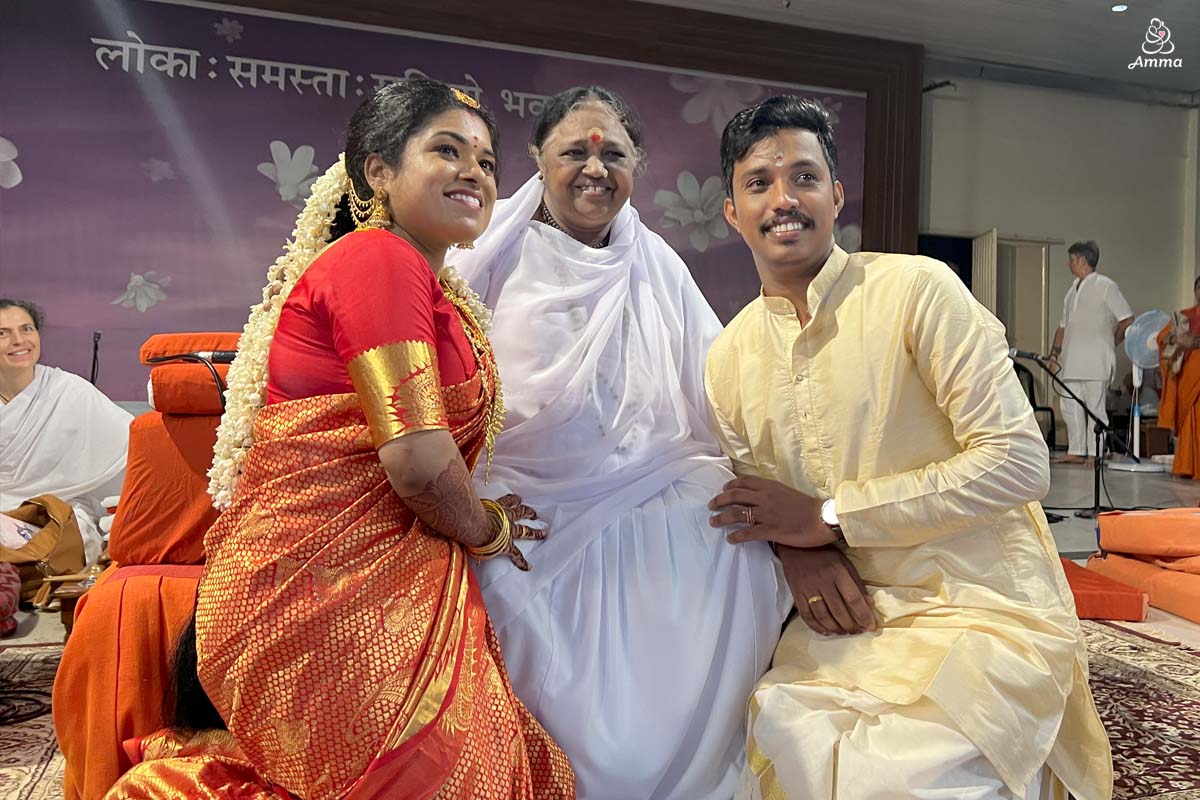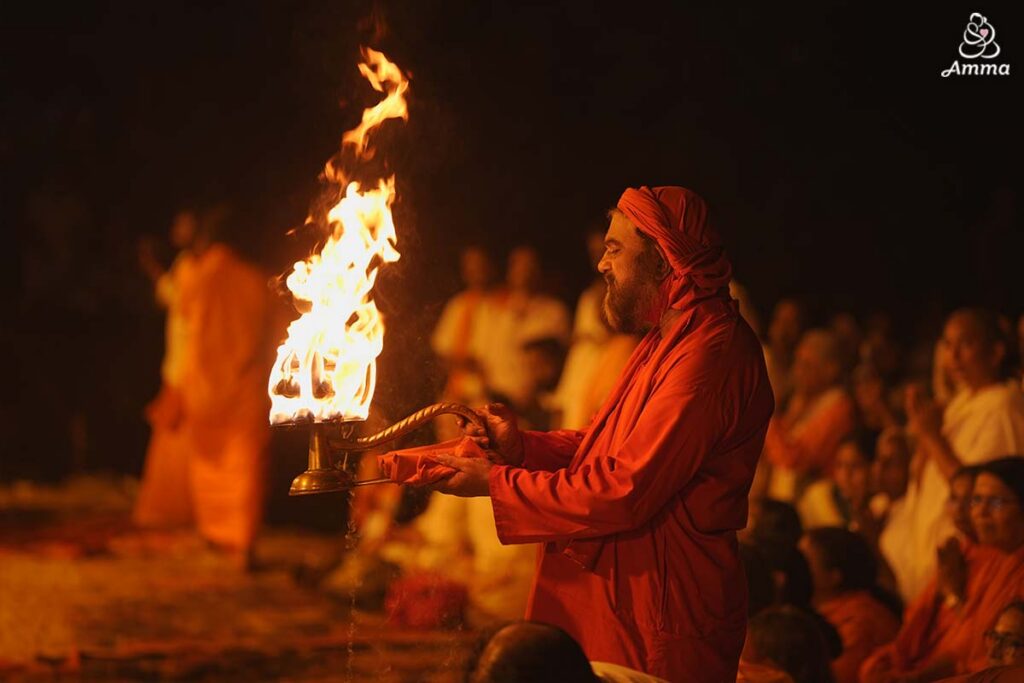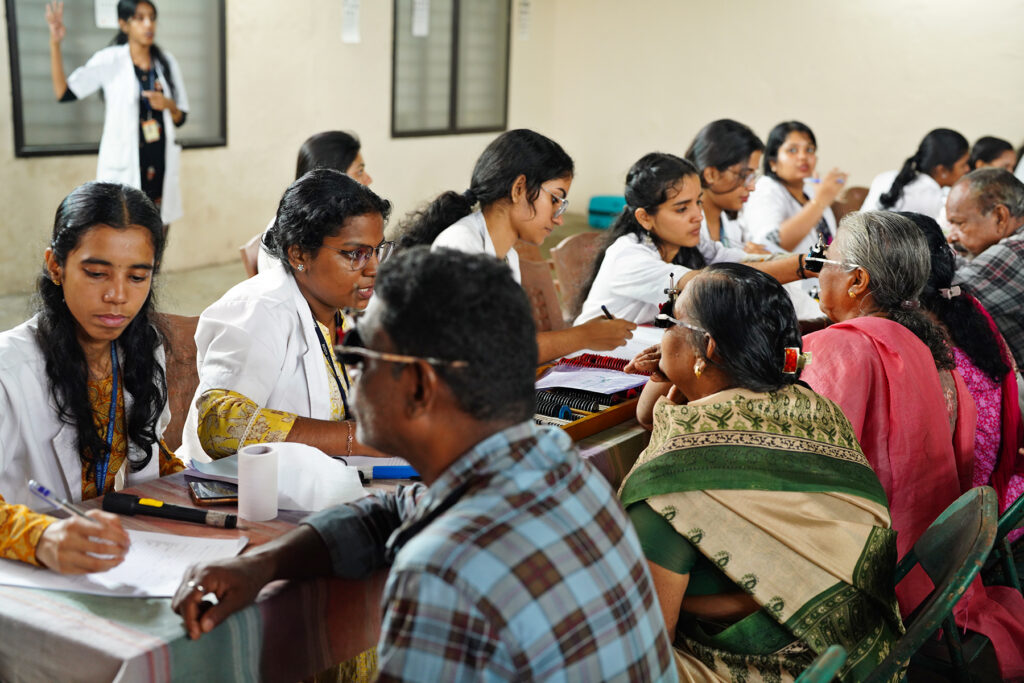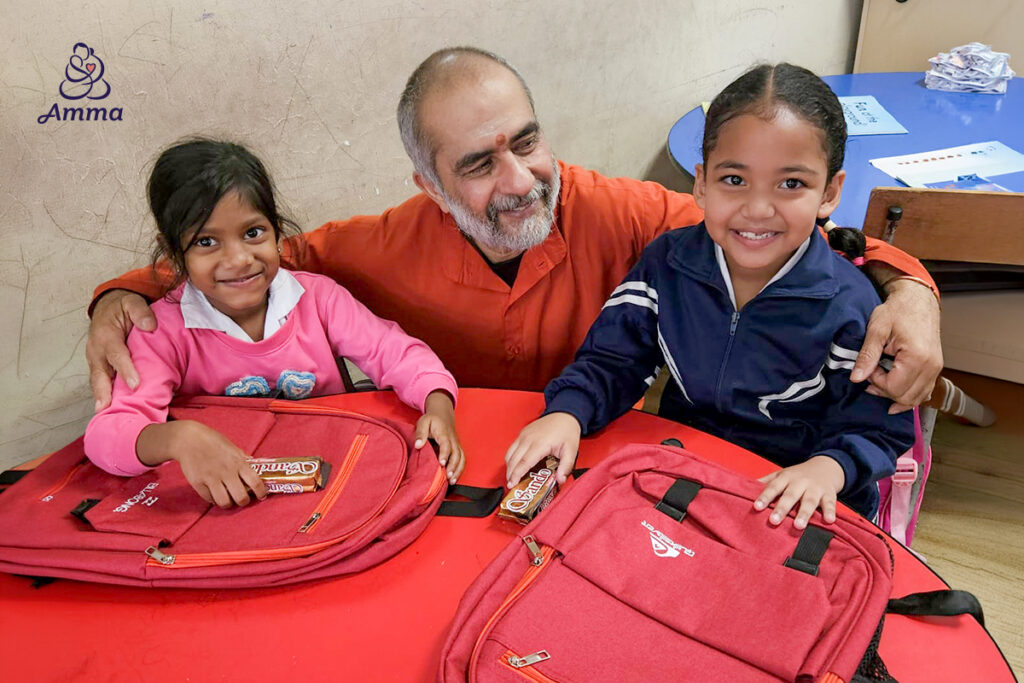The story that Athira tells is yet another profound example of how Amma is there for everyone who comes to her with their sorrows—sorrows sometimes unbearable for many of us to even hear. But Amma listens. She then cares for those who seek her protection and guides them to a life of happiness and peace.
In Athira’s case, she was rescued by Amma at the age of 15 and taken into the care of the Ashram’s orphanage in Paripally, Kerala. Although she underwent severe traumas as a child, Athira says she is grateful to Amma for giving her a life where she is able to help others in even deeper suffering.
Athira is sharing her experiences after Amma conducted her marriage to Sandeep, both of them employees with AMMACHI Labs at Amrita University. Amma shed tears of joy as she blessed this new chapter in their lives.
“Sandeep has a heart filled with compassion for accepting Athira into his life and Amma feels happy for them. Amma requests that everyone bless and pray for the couple. Amma also wishes to find a suitable groom for Athira’s younger sister. Athira’s father died at a young age, with her mother psychologically unstable and suffering from severe epilepsy,” expressed Amma.
“For me, Amma is everything and she always will be. She is my mother, my father, my friend, my Guru—everything,” says Athira. “Amma was so happy at our marriage. She said Sandeep is very compassionate and that compassion in his heart is why he chose me. He understands the life I went through and still accepts me. So i thought, yes Amma gave me this life with him.”
Athira and Sandeep are a much different pairing than Athira’s parents. Her mother and father married happily when they were young, but things started to change when Athira turned three years old. Her mother’s own serious traumas as a child resurfaced and she became mentally unstable and started having seizures.
Seeing her mother have the fits was very stressful for Athira and the rest of her family. Much of the household income went to medical treatment to try to control the epilepsy. Much of the rest went to Athira’s father drowning himself in alcohol to escape the pain. Athira simply accepted the circumstances and did the best she could as a child.

“Then at the age of 38, my father passed away due to all the tension, and we didn’t have anyone to take care of my mother. Someone told us about the orphanage run by Amma, so we came to Amritapuri to ask Amma what to do. She listened to all of our problems and immediately said she would take care of us because my mother was not able.”
Amma put Athira and her sister, who is five years younger, into the care of Amrita Niketanam Orphanage in Paripally. It was not an easy transition given the unstable life Athira had faced. But she could intuitively feel Amma’s love for her.
The warden shared stories about Amma’s compassionate outreach to people in need, providing them with food and water, homes, healthcare, education, and disaster relief. But even more striking for Athira was the element that matched her life—Amma was directly taking hundreds of thousands of people into her arms to discuss their problems and find solutions.
I didn’t get any motherly affection from my mother. But I get more than that from Amma.
Athira
And then Athira’s experience deepened, especially for her own healing. She learned that Amma’s humanitarian work was grounded in the spiritual principles of Sanatana Dharma. Though she knew almost nothing about daily practices and the scriptures, Athira was guided by her warden’s kind and gentle teachings.
“She taught us the importance of doing archana and sat and chanted with us. We didn’t know Sanskrit, not even proper pronunciation. So it was difficult, but she patiently taught us,” remembers Athira.
“This kindled my faith in Amma. It brought me hope. Whenever I faced my own difficulties, I would go to the prayer hall in the orphanage and pray to Amma’s photo. I didn’t get any motherly affection from my mother. But I get more than that from Amma.
“Amma gave me that courage. Amma is the only support I had, especially mental support. We would come to Amritapuri for Amma’s darshan. I would tell her all my problems and she would guide me to the next step.”
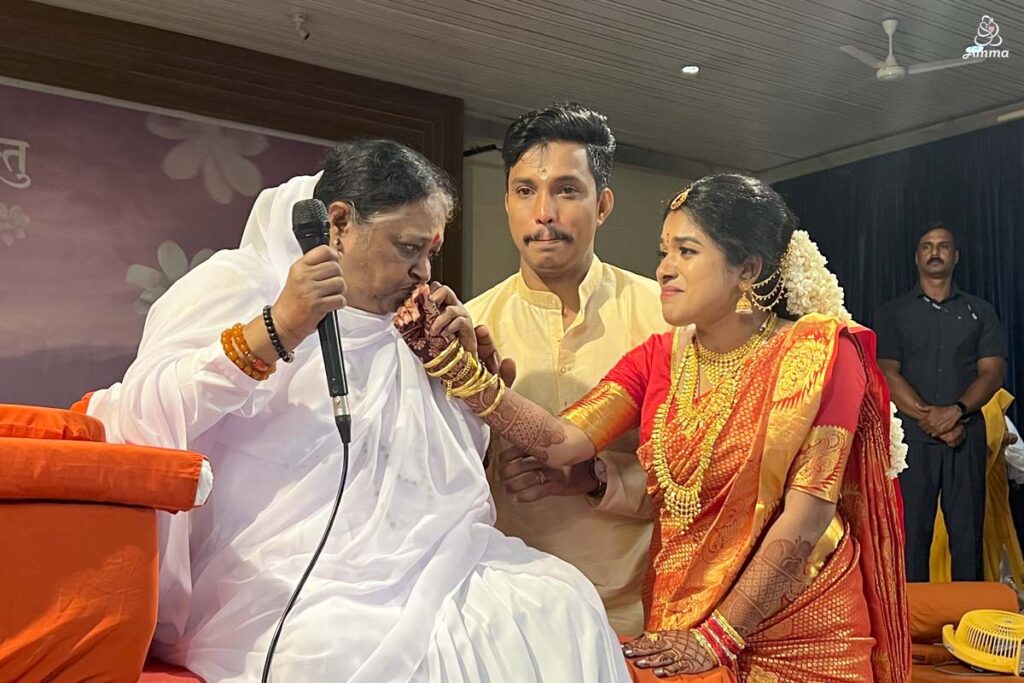
Having finished her school years in Paripally, Amma asked Athira if she would like to move to Amritapuri and study the Bachelor of Business Administration (BBA) at Amrita University. Amma watched over her very closely, even instructing Athira when she was not confident about how to move forward in life.
“After BBA, Amma said I was qualified to get a job at an outside company, but I was really afraid because I didn’t know the world. My life was the Ashram and the University. So Amma told me to join AMMACHI Labs and travel to the villages to teach yoga.
“Seeing the poverty in the villages changed me so deeply that I’ve become another person. I always thought I was alone going through my many struggles, but these are people who often survive on just one meal a day.”
As Athira gained her own inner strength, her responsibilities expanded to projects that focus on women’s empowerment. She was assigned to Amrita’s Centre for Women’s Empowerment & Gender Equality, which works with the University’s UNESCO Chair for Gender Equality & Women’s Empowerment. The vision is a society where there are no barriers to the social, emotional, and economic empowerment of women.
The villagers don’t think about tomorrow. They live in the moment and are peaceful with whatever God sends their way.
Athira
Athira’s own fears began to disappear as she joined teams travelling to villages to give household women vocational and life skills training, instilling them with self-confidence and independence. Once afraid to even leave Amritapuri, Athira met with impoverished families in Kerala, Odisha, Chhattisgarh, Jharkhand, Gujarat, Uttar Pradesh, and Tamil Nadu. And in the long run, she realised that she was the one who learned the most about how to face life’s challenges.
She explains that for the villagers, their days are based upon heading to the fields in the morning, coming back in the evening, and sleeping by seven. With a culture that is still grounded in ancient traditions, they join together for festivals to honour Mother Nature and the Divine.
“They don’t think about tomorrow. They live in the moment and are peaceful with whatever God sends their way. They remain united as families and communities. It’s seasonal work, so sometimes they earn, sometimes they don’t. Sometimes that even means a meal consists of just rice and a few chilis. Still, they are fine,” says Athira.
“For us, we are focused on earning and saving. Yes, it’s part of economic development, I’m not saying it’s wrong. But we’ve become too driven by it. We have lost the ability to be grateful for what we already have. The villagers accept the reality of their lives and remain content. Witnessing their attitude deeply inspired me. They are pure souls.”
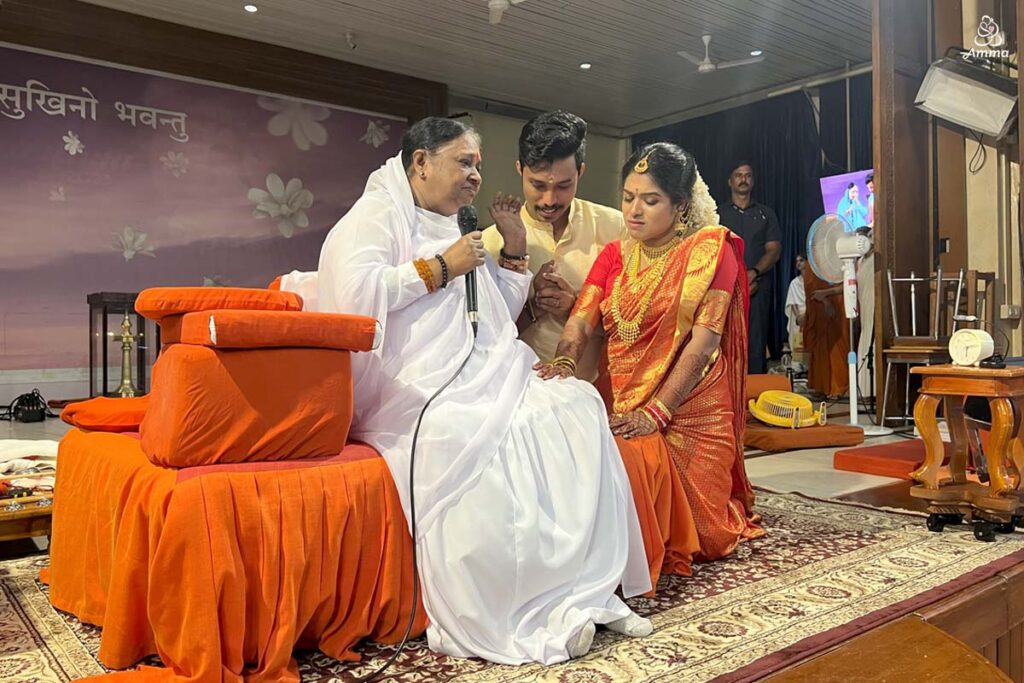
At the same time, Amma advised Athira to do part-time studies for a Master of Business Administration with the Indira Gandhi National Open University. In this way, Athira could further combine her on-the-ground work in the villages with an academic framework for economic empowerment of the women.
One of her most recent assignments was the SANKALP project in partnership with the Govt of India—Skill Acquisition and Knowledge Awareness for Livelihood Promotion. It was a critical initiative with a target population of 4,500 women throughout India. Athira managed nine centres in north Kerala.
“We focused on providing housewives six-month training courses in trades such as tailors and beauticians. When we communicated with them, we began by listening to them directly to understand their life situations.
“Many of them have faced challenges such as domestic violence and have not been educated. Some cannot even read. Most have never had any form of independence in their lives, so we reach out to them to help them gain courage and self-reliance.”
Perhaps what is most profound in reflecting upon the story Athira shares is the ripple effect of Amma’s love and compassion. What started as Athira’s rescue from poverty and neglect ultimately led her to a life in which she helps save thousands of other people from suffering.
“Amma is working through our hands. Whatever we are doing, regardless of what challenges we face along the way, it is all right. It is our seva to Amma. In actual fact, this is a very rare gift we have been given and I can only bow down in gratitude to Amma.”


